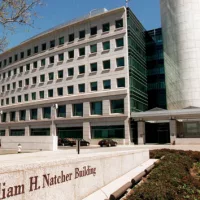
(WASHINGTON) — The federal government has drastically lowered some of the funding that universities and research institutions receive from medical and scientific grants.
News of the cuts rattled the scientific community with many scientific institutions set to lose millions of dollars in funding annually.
The National Institutes of Health (NIH), the country’s primary agency responsible for conducting and supporting medical research, provides federal research grants to universities and research institutions in two separate buckets – direct and indirect costs.
Direct costs are expenses related to conducting research, such as paying for researchers’ salaries or travel as well as funding the equipment and supplies necessary for experiments. Indirect costs, also known as facilities and administrative (F&A) costs, include other expenses such as student services and paying for building expenses like utilities.
Previously, most universities had negotiated indirect cost funds with the federal government, with some acquiring as much as 70% or more. Now, those rates will be capped at 15%.
Attorneys general from 22 states immediately sued to block the NIH from enacting the rate change, arguing the policy would result in “catastrophic financial consequences.”
The lawsuit alleged that the policy would likely result in the closure of research programs, layoffs and furloughs, disruptions to clinical trips and “potentially [jeopardize] people’s lives and health.”
“Indirect costs are the backbone of IHEs’ research programs and cover everything from utilities to facilities and equipment maintenance to payroll for faculty and staff to compliance programs, hazardous waste disposal, and more,” the lawsuit said. “They quite literally keep the lights on.”
The lawsuit asked the Massachusetts District Court to immediately issue a temporary restraining order blocking the policy, arguing the policy would cause irreparable harm and is a clear violation of Administrative Procedure Act, which governs how the federal agencies create and enforce regulations.
In a social media post, the NIH noted that $9 billion of the $35 billion for research that was granted last year were for indirect costs. The agency anticipates that the rate cap will save more than $4 billion annually.
Funding from the NIH supports roughly 412,000 jobs and $92 billion in economic activity, according to a report from United for Medical Research, a coalition of top research universities, medical associations, and biomedical and pharmaceutical companies.
The report argues that NIH funding is not just responsible for university jobs – but also supports local industry and economic activity that bring additional benefits to their communities and states.
In a letter to students and faculty, Harvard University addressed the rate cuts noting, “the discovery of new treatments would slow, opportunities to train the next generation of scientific leaders would shrink, and our nation’s science and engineering prowess would be severely compromised.”
In a similar letter, Stanford University noted that, “a cut of this magnitude would potentially have deep impacts on medical care, human health, and America’s place in the world as the leader of biomedical research.”
Research funding isn’t limited to institutions in the Northeast or California. Florida, Tennessee, Missouri, Ohio and Georgia all received roughly $1 billion in funding from the institutes, according to active funding data from NIH.
The University of Alabama-Birmingham, the state’s largest employer, is among the top recipients of NIH funding, and received more than $413 million in NIH awards in 2023.
North Carolina, with more than 3,000 active projects and $3 billion in active NIH funding, and Texas, with more than 4,400 active projects and $2.5 billion in active NIH funding, are also among the GOP-leaning states that received NIH grants and support.
Copyright © 2025, ABC Audio. All rights reserved.














